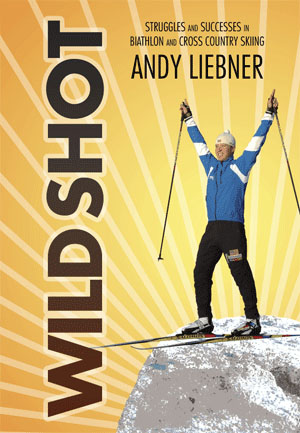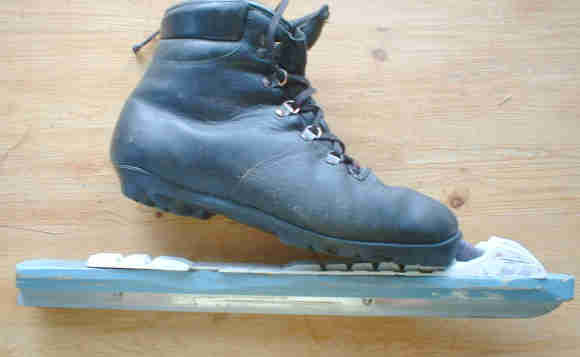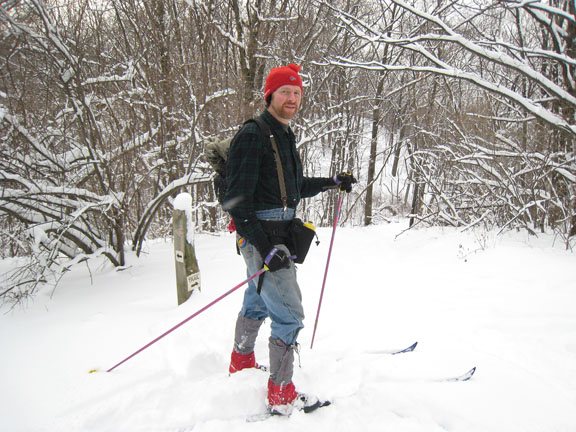Anikin Clinic Details
Anikin Clinic 2/2000
28 attended. Maybe 10 racers, 6 sport, 6 tour, 6 casual.
Format:
intro explanation
for each technique:
on snow drills for dryland imitation of the basics
on snow demonstration at a small loop trail
2 practice loops
2 loops videotaping
immediate feedback for each loop
summary individual feedback as a group
meeting room video analysis twice a day of 3 techniques at a time
Lessons:
classic first day: double pole, dp kick, stride flat, stride up
skating second day: open field, v2, v1 uphill, diagonal uphill, jump turn, jump hill
drills first day:
bent over arms striding/swinging—long, naturally extended arms swing from horizon to horizon
bent over shoulder motion—extend forward and drop rear
bent over hip thrust doublepole imitation—long arms, body drop to horizontal, w/ hip thrust
bend rear ankle down sharply
balance over bent front leg, arms forward and back, leg rearward
same thing only with motion
swing leg thru without slapping
drills second day:
doublepole imitation with more body drop and 2 beats
balance over bent front leg, arms forward and back, skate leg out to side and rearward
same thing with motion
Eric Heiden drill—deep body drop, slow diagonal skate with full leg extension and deep knee/ankle bend and total arm extension fore and aft, no poles
balance over bent front leg with both arms to rear
same thing with motion—off same leg or both legs, to imitate open field and v2
other dryland explained:
ski walking with bounce
ski bounding without poles
ski bounding with poles—best if up 800m hill 5-10% grade
recover with dip in cold lake and sauna
stretching before and after
eat 2 hours before, a little during
Main Pointers:
general:
·50-50 classic/skate skiing and training
·Formula Four: strong stretch, strong push, relaxation, pendulum
·poling and kicking and balance and body drop is all about the same for all techniques (all tech’s use bodydrop; less for striding 49>45deg; dp: 85deg forward lean to zero-deg, horizontal to ground)
·total followthru of poles vital, esp on uphills
·take advantage of all reserve motion: go from full extended standing up with forward lean and hip thrust to body down and total knee and ankle bend then to full extension out of kick leg and pole arm
·fastest motion of kick or pole happens when vectors are most pointed to the rear—when hand is going past knee and kick right under body
·plant poles next to bindings, except for uphills when they plant behind foot
·arms more bent going uphill
·torso more upright the steeper the uphill
·zero effort for arm and leg drop after poling, only gravity, total relaxation
·power of poling and kicking happens at same time (this maximizes pendulum effect when added with total relaxation of all falling motions–with fastest motion of kick and poling happening as foot goes under hip and pole past knee)
·poling in front of body ruins glide–motion should go right past torso at max speed; glide happens after arms are rearward of body
·in all tech’s, arms start out naturally bent but long/extended then collapse a little as torso weight loads onto arms then as arms drop they fully extend—best if arms can stay long as torso loads poles—just as in drill
·kick and pole should both be aided by the whole body falling forward—if not caught by foot and pole body should fall facefirst on ground
·hip thrust before any type of dp (skate or classic) preloads/stretches belly muscles
·recovery foot only hits snow when it’s opposite of gliding foot–no slap, and gets shoved far forward
·head in straight line with spine—look 2 meters down trail in classic, 4 meters in skating
·everything you lift causes something else to drop—lift legs drops butt
·Antonina about breathing (from previous clinic): breath from diaphragm, let belly and chest sag, lower body position lets belly hang easy; easy deep breathing allows for relaxed skiing; the hardest possible ski effort should have the deepest, easiest breathing—no tension ever in breathing!
·Antonina bodyweight action (from previous clinic): glide with weight on heel; when kicking and poling get max force by ‘tipping over’ like a funny water bird while keeping arm extended.
·Antonina heartrate tips: never train more than 100K beats per day; count beats in a.m. 5 min after rising, then do 1 minute deep kneebends and count again, marking rate every 10 secs for 1 minute. Diary of these numbers. If they change by 5 beats, OK. If they change by 10, talk to coach.
classic:
·classic is foundation of all tech’s
·the longer your heel is down the better for classic kick
·shove foot more forward the steeper the hill (until the angle is ‘open’)—further forward shove allows for deeper ankle bend and heel-down longer (classic, but similar with skating)
·classic kick is very quick but long; bent knee and ankle lets you use all possible ‘reserve’
·dp: hands go past legs below knees (in striding, hands go past just above knees)
skate:
·skating poling is twice as fast as skating kick and starts with torso crunch, then kick
·skating: hands go past legs just above knees
·body drops on poles 5 degrees to preload poles before kick in skating
·in skating chest is centered over ski
·big races are done 50% v2
·v1 has offset hand height and poleplant next to each binding—one leg bent, other done kicking out straight





